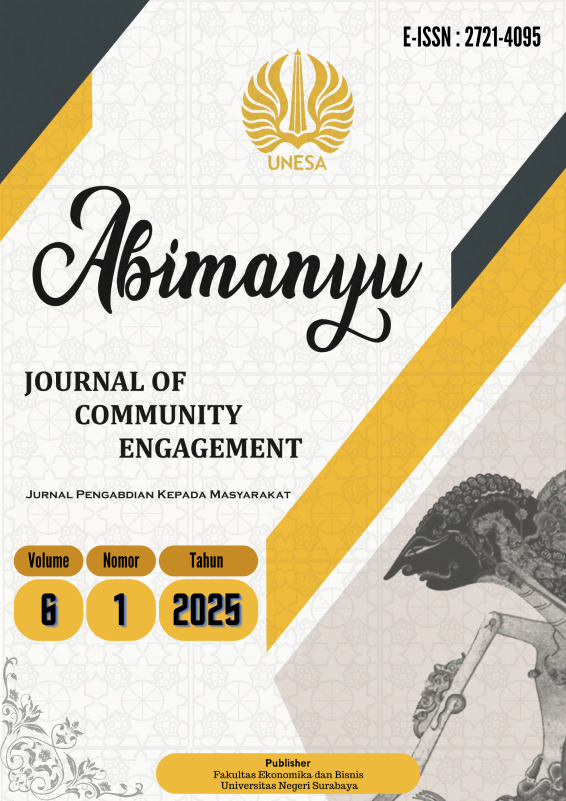Generasi Emas 2045: Peningkatan Kapabilitas Guru Pendidikan Anak Usia Dini melalui Implementasi Teknologi Artificial Intelligence
Keywords:
Quality of Education, Golden Generation, Artificial Intelligence, Teacher Capabilities, Innovative Learning, Early Childhood EducationAbstract
Preschool teachers (kindergartens) encounter challenges in the current era of rapid technological advancement. The constraints imposed by technology-based learning methodologies have resulted in the adoption of disparate educational practices among kindergartens, thereby engendering educational disparities. Indeed, the quality of early childhood education serves as a foundational element in developing exceptional human resources (HR) who will become the nation's future leaders. In this regard, it is imperative for preschool teachers to adopt innovative learning methodologies, given their role in shaping children's cognitive, social, emotional, and linguistic development. In light of these challenges, the present Community Service initiative aims to provide a workshop focusing on variations in learning methods and teaching materials, particularly on technological and Artificial Intelligence (AI) approaches.
The community service activity was conducted at Raudhatul Athfal (RA) Nizhamiyah, located in Rejoagung Village, Ploso Sub-district, Jombang Regency, East Java Province. Rejoagung Village is a community with a predominantly lower-middle-class economic profile, with a significant proportion of the workforce engaged in market and factory-related occupations. This underscores the pressing need for the implementation of this community service initiative. This community service activity could contribute to Sustainable Development Goal #4, which focuses on the quality of education.
The results of this community service activity have shown an increase in the knowledge and skills of productive economic partners. RA Nizhamiyah teachers participating in the activity have been able to implement artificial intelligence (AI) to create creative and innovative teaching materials, such as interactive quizzes accompanied by visualization and audio, educational children's songs, and PowerPoint presentations. The post-training evaluation revealed that the participating teachers demonstrated a profound comprehension of creating AI-based teaching materials, with a mean score of 94.28 out of 100. Moreover, the evaluation results indicated that 91.42% of the participants expressed a strong intention to incorporate AI in creating more innovative teaching materials.
References
[1] Abu Taleb, T.F. 2013. “NAEYC’s Key Attributes of Quality Preschool Programs” Applied to the Jordanian Kindergarten Context. Early Childhood Education Journal, 41, 307–314. https://doi.org/10.1007/s10643-012-0550-9
[2] Blackwell, C. K., & Lauricella, A. R. (2020). Technological Tools for the Early Childhood Classroom: Beyond Screens and Right on Time. Journal of Early Childhood Research, 18(4), 354-368.
[3] Drigas, A., & Kokkalia, G., & Lytras, M. D. 2015. Mobile and multimedia learning in preschool education. Journal of Mobile Multimedia, 11(1–2), 119–133.
[4] Guskey, T. R. (2002). Professional Development and Teacher Change. Teachers and Teaching, 8(3), 381-391.
[5] Jung, H., & Hasan, A. (2016). The impact of early childhood education on early achievement gaps in Indonesia. Journal of Development Effectiveness, 8(2), 216–233.
[6] Kirkpatrick, D. L., & Kirkpatrick, J. D. (2006). Evaluating Training Programs: The Four Levels (3rd ed.). Berrett-Koehler Publishers.
[7] Lewin, K. (1947). Frontiers in Group Dynamics: Concept, Method and Reality in Social Science; Social Equilibria and Social Change. Human Relations, 1(1), 5-41.
[8] Liu, L., Gong, C. (2023). The Application Design of Modern Educational Information Technology in Kindergarten Teaching. In: Jan, M.A., Khan, F. (eds) Application of Big Data, Blockchain, and Internet of Things for Education Informatization. BigIoT-EDU 2022. Lecture Notes of the Institute for Computer Sciences, Social Informatics and Telecommunications Engineering, vol 466. Springer, Cham. https://doi.org/10.1007/978-3-031-23947-2_37
[9] Luckin, R., Holmes, W., Griffiths, M., & Forcier, L. B. (2016). Intelligence Unleashed: An Argument for AI in Education. Pearson Education.
[10] Matthew, I. A. (2015). Participation of the Private Sector in the Provision of Early Childhood Care, Development, and Education: Issues, Challenges, and Way Forward in Nigeria’s Context. Childhood Education, 91(5), 370–377. https://doi.org/10.1080/00094056.2015.1090852
[11] Mavuru, L., Kuyayama, A., & Mukaro, J. P. (2024). Development of Early Childhood Education Teachers in Information and Communication Technologies for Literacy or Pedagogy. International Journal of Learning, Teaching and Educational Research, 23(4), 321–333. https://doi.org/10.26803/ijlter.23.4.18
[12] Nakajima, N., Hasan, A., Jung, H., Kinnell, A., Maika, A., & Pradhan, M. (2021). Built to Last: Sustainability of Early Childhood Education Services in Rural Indonesia. Journal of Development Studies, 57(10), 1593–1612. https://doi.org/10.1080/00220388.2021.1873283
[13] Salim, S., Abubakar, S. R., Hindaryatiningsih, N., Darnawati, D., Irawaty, I., & Saputra, H. N. (2020). Pelatihan Pengembangan Kreativitas Guru PAUD Melalui Kerajinan Tangan Dengan Teknik Decoupage. Abimanyu: Journal of Community Engagement, 1(2), 34–41. https://doi.org/10.26740/abi.v1i2.7638
[14] Wardoyo, D. T. W., Kautsar, A., & Fazlurrahman, H. (2020). Strategi Pengembangan Penulisan Karya Ilmiah pada Guru di Kabupaten Sidoarjo. Abimanyu: Journal of Community Engagement, 1(1), 16–23. https://doi.org/10.26740/abi.v1i1.6534
[15] World Bank. (2014). Indonesia - Early Childhood Education and Development Project (ECED) implementation completion and results report. Washington DC: Author. Retrieved from https://documents.worldbank.org/curated/en/ 854891468267037215/Indonesia-Early-Childhood-Education-and-Development-Project-ECED
[16] Wu, X., & Zhao, P. 2022. "The Face-Assisted Analysis Framework of the Multi-Interactive Platform of Pre-School Guiding in the Multimedia Environment," 2022 6th International Conference on Intelligent Computing and Control Systems (ICICCS), pp. 1721-1724, doi: 10.1109/ICICCS53718.2022.9788343
[17] Yudhoyono, A. H., Nadia, F. N. D., Mudzakkir, M. F., & Suhariadi, F. (2024). Bridging the Gap: Orchestrating Indonesian Higher Education. Journal of Theoretical and Applied Management (Jurnal Manajemen Teori Dan Terapan), 17(2), 333–354. https://doi.org/10.20473/jmtt.v17i2.60737
[18] Zorn, I., Justino, J., Schneider, A., Schönenberg, J. (2016). Potentials of Digital Technology for Participation of Special Needs Children in Kindergarten. In: Miesenberger, K., Bühler, C., Penaz, P. (eds) Computers Helping People with Special Needs. ICCHP 2016. Lecture Notes in Computer Science, vol 9759. Springer, Cham. https://doi.org/10.1007/978-3-319-41267-2_41
Downloads
Published
How to Cite
Issue
Section
 Abstract views: 521
,
Abstract views: 521
, PDF Downloads: 217
PDF Downloads: 217





